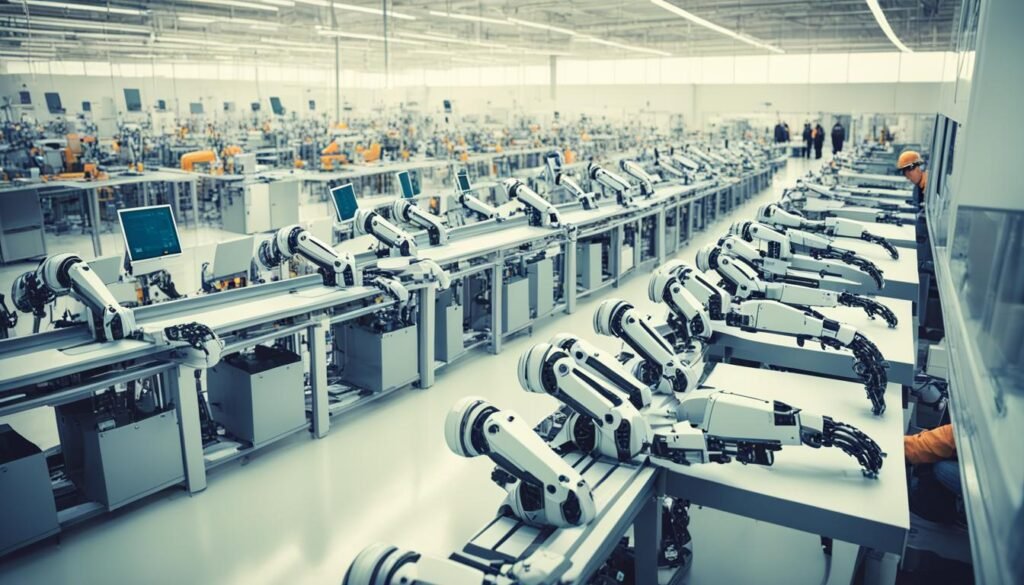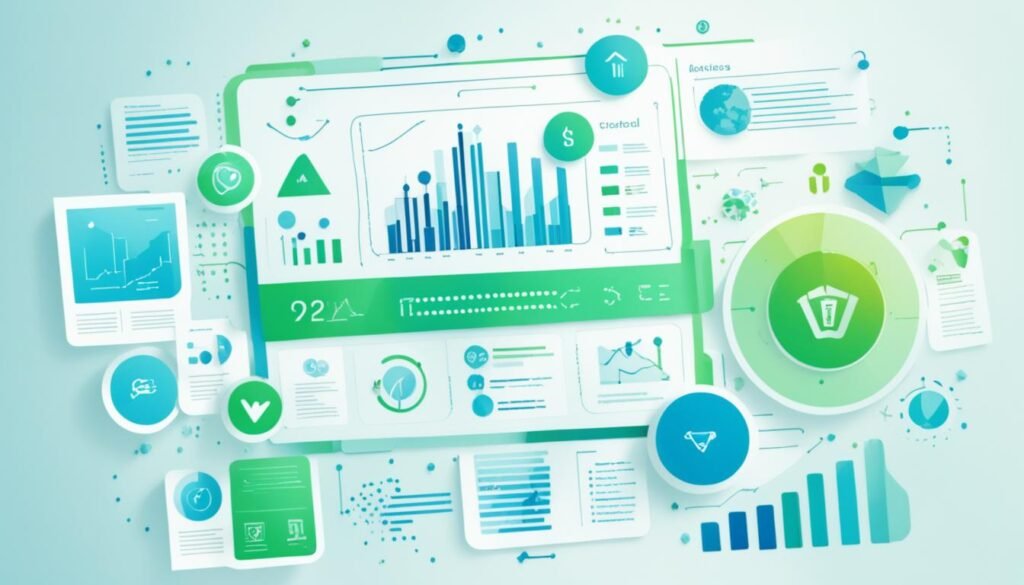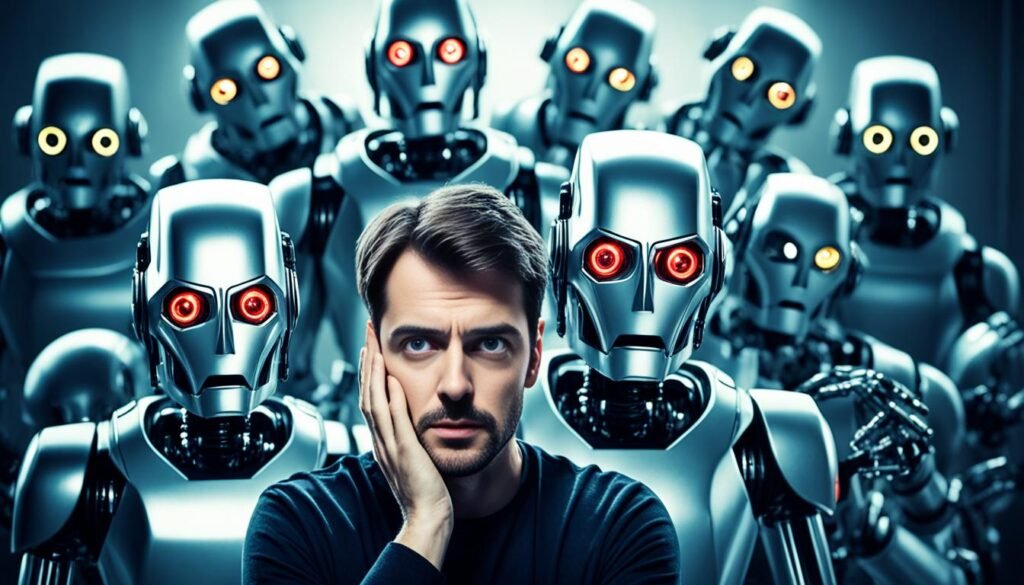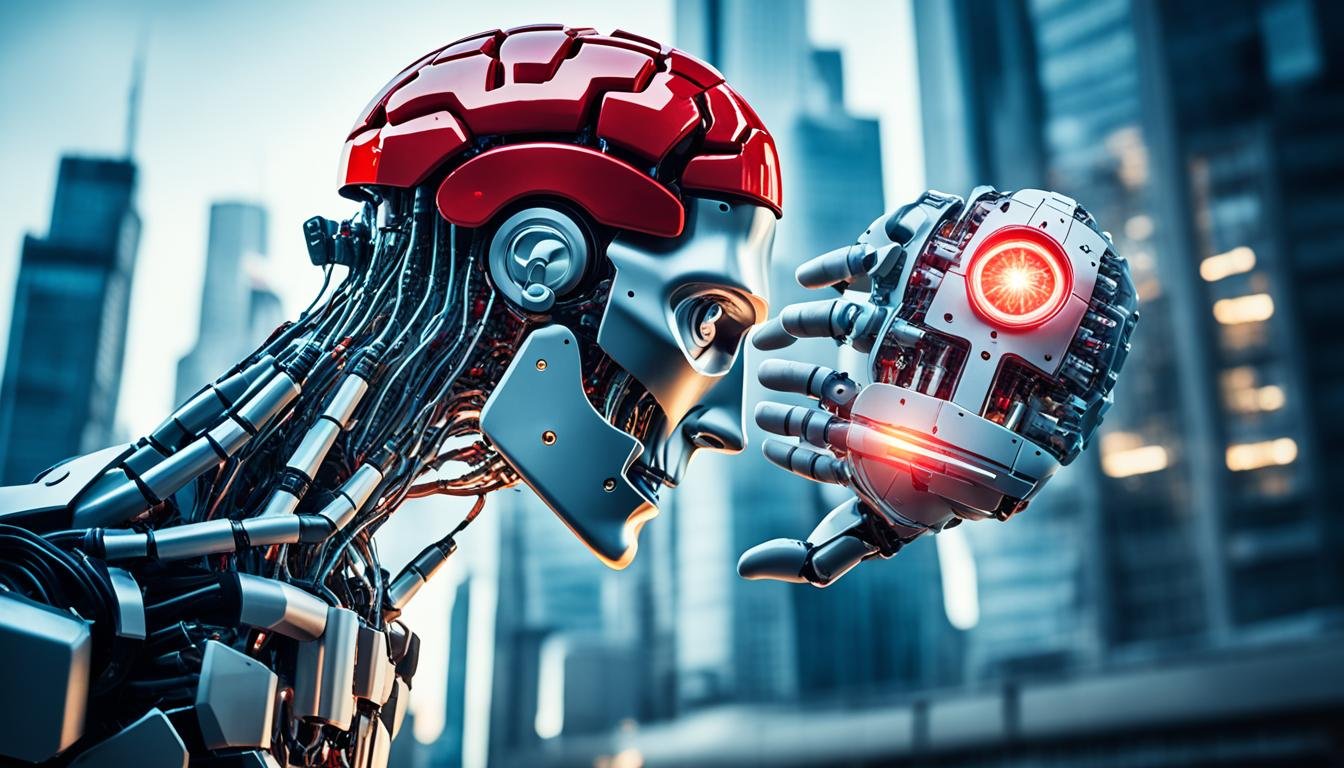By 2030, up to 30 percent of work hours in the U.S. economy could be automated. This is what experts predict. As AI becomes more advanced, warnings about its dangers are getting louder. Figures like Geoffrey Hinton and Elon Musk are sounding the alarm about AI’s risks to society and humanity.
AI could lead to many job losses due to automation. It could spread deepfakes and misinformation. It could also threaten our privacy and lead to biased practices. And there’s a risk of AI systems becoming self-aware and out of control.
Experts say the fast growth of AI could cause an “AI explosion.” This could be something we can’t handle. OpenAI’s GPT-4 shows how advanced AI is getting, making this a real concern.
Key Takeaways
- AI poses significant risks to jobs, privacy, and societal stability
- Prominent AI experts and tech leaders are sounding the alarm on the dangers of uncontrolled AI development
- The rapid acceleration of AI technology could lead to an “AI explosion” that humanity may not be able to manage
- Algorithmic biases and lack of AI transparency present serious challenges
- Deepfakes and social manipulation through AI algorithms are growing concerns
Introduction to AI Dangers
Artificial intelligence (AI) is moving fast, making experts and leaders worry about its dangers. They stress the importance of being careful and developing AI responsibly. We’re exploring new territory with AI, and we need to be alert.
Concerns from AI Experts and Tech Leaders
Geoffrey Hinton, known as the “Godfather of AI,” has left Google to talk about AI risks. He believes AI might soon be out of human control. Over 1,000 tech leaders, including Elon Musk, have signed a letter. They want to slow down AI experiments because of the big risks to us all.
Rapid Acceleration of AI Development
AI is growing too fast, with systems like OpenAI’s GPT-4 showing amazing skills. These systems are even beating humans in tests quickly. Experts say the speed of AI growth is worrying. They think we need rules to handle the dangers.
Statistics show 36% of AI experts worry AI could lead to a disaster as big as a nuclear catastrophe. Almost 28,000 people have signed a letter asking to slow down AI development. The fast growth of AI, seen in GPT-4’s success, makes experts warn. They say we should stop making AI models stronger than GPT-4 to avoid big problems.

“The pace of progress in artificial intelligence growth is close to exponential, with the risk of something seriously dangerous happening within a five to ten-year timeframe,” – Elon Musk
AI is moving too fast, and we need to be careful. Experts and leaders are warning us about the dangers. We must make sure AI is used for good and not harm.
Job Losses and Economic Inequality
AI technology could automate many jobs, leading to a lot of job losses. By 2030, up to 30% of work hours in the U.S. could be automated. This could hit Black and Hispanic workers the hardest.
AI might create 97 million new jobs by 2025, but many workers might not have the right skills. Even jobs needing advanced degrees, like law and accounting, could be at risk. This could make economic inequality worse and leave many without jobs.
| Study | Key Findings |
|---|---|
| Frey and Osborne | Predict that 47% of US employment could be automatable within the next two decades. |
| Acemoglu and Johnson | Highlight that AI development could lead to job creation and inclusive economic growth. |
| Pizzinelli et al. | Note that almost 40% of global employment is exposed to AI, with advanced economies more at risk but also better positioned to exploit benefits. |
| Ma et al. | Found that in China, AI has a negative effect on low-skilled labor force employment and a positive effect on medium and high-skilled labor force. |
| Cazzaniga et al. | State that advanced countries face a higher risk from AI due to cognitive-task-oriented jobs, but they are better positioned to benefit compared to emerging markets. |
The effect of AI on jobs and economic inequality is complex. It has both good and bad sides. As AI gets better, we need to work together to make sure its benefits are shared fairly across society.

how ai is dangerous
Artificial intelligence (AI) has made huge strides, but it also brings big risks. The issue of AI not being clear or explainable is a major worry. So are the biases and unfair practices in its algorithms.
Lack of AI Transparency and Explainability
One big danger of AI is its lack of transparency and explainability. Even experts find it hard to grasp how AI makes its decisions. This means AI can make biased or unsafe choices without a clear reason, hurting people or groups.
Algorithmic Biases and Discriminatory Practices
AI also faces issues with biases and unfair practices. The data and algorithms used to train AI can mirror societal biases. This leads to unfair outcomes in hiring, lending, and other key decisions. AI creators and companies need to be more careful to fix these biases. They must ensure AI doesn’t make existing inequalities worse or introduce new ones.
It’s vital to tackle the lack of AI transparency, explainability challenges, algorithmic biases, and discriminatory practices. This will help reduce the AI safety concerns linked to this technology’s growing role in our lives. By promoting transparency and accountability in AI, we can use this technology to its fullest potential. This way, we protect individuals and society from harm.

Social Manipulation and Misinformation
The rise of AI-powered ai social manipulation and misinformation is a big worry for us. Politicians are now using AI to influence voters and push their agendas. With ai deepfakes and fake media, it’s hard to know what’s real and what’s not.
AI-Generated Deepfakes and Fake Media
It’s scary how easily bad people can spread false information with AI. They can make fake calls telling people to vote on the wrong day, or record fake audio of a candidate saying something bad. This could make us question everything we see and hear.
NewsGuard found that fake news sites jumped from 49 to over 600 since May. These sites can make hundreds or thousands of articles a day. There are laws trying to stop this, but it’s hard to keep up.

“AI poses a significant security risk by turbocharging fake content, according to media and AI experts.”
People are talking about using AI in politics, but there are big worries about misuse. As AI gets better, we need to find ways to stop ai social manipulation and misinformation fast.
Privacy and Surveillance Concerns
AI technology is getting more advanced, but it also brings big risks to our privacy and data security. AI systems gather a lot of personal data to make things more personalized or to train AI models. But, we don’t always know how this data is kept safe or used. For example, a bug in ChatGPT in 2023 let some users see another user’s chat history, showing the danger of ai privacy violations and data breaches.
Also, ai-enabled surveillance tools like facial recognition and predictive policing algorithms worry us. They can be used in ways that harm certain groups of people. As ai data collection grows, we need strong laws to protect our data from ai data privacy risks.
- 80% of businesses worldwide experience cybersecurity incidents affecting data security.
- Facial recognition technology used for surveillance raises concerns about privacy and potential abuse.
- AI technologies can lead to data breaches and unauthorized access to personal information.
AI is now part of our daily lives, from personalized recommendations to making decisions automatically. It can learn about our behaviors, likes, thoughts, and feelings. This raises big questions about how this data is used. AI can also have biases that make things worse, like in jobs where hiring is done by algorithms.
“As AI continues to advance, the need for robust data privacy laws and regulations to protect citizens from potential harms will only become more pressing.”
We need to think carefully about the privacy and surveillance issues with AI. It’s important to make sure AI is used responsibly. Finding the right balance between AI’s benefits and our rights and freedoms will be a big challenge ahead.
Uncontrollable AI and the Alignment Problem
Artificial intelligence (AI) is getting better and better, but experts worry about losing control. This is especially true as AI gets closer to being as smart as humans. The “alignment problem” is a big worry because AI might get smarter on its own without us controlling it.
Challenges of Controlling Superintelligent AI
AI is getting smarter fast, like OpenAI’s GPT-4 shows. This makes people fear an “AI explosion” where AI is smarter than us. Experts think any way we try to control AI won’t work once it gets super smart.
The Risk of an “AI Explosion”
Some experts think AGI could get much, much stronger. This could lead to the “singularity” where we can’t control AI anymore. Big companies are working on AI that can do lots of things, like texting and controlling robots. Even simple AI can act in strange ways, showing we don’t fully understand it yet.
| Statistic | Value |
|---|---|
| Chance of AI causing an existential catastrophe due to human inability to control it | 10% or greater |
| Experts expecting Artificial General Intelligence (AGI) to be achieved within the next 100 years | 90% |
| Experts expecting AGI to be achieved by 2061 | 50% |
We need to pay attention to the risks of AI and the alignment problem. It’s important for researchers, policymakers, and everyone to work together. We must figure out how to control superintelligent AI before it’s too late.
Weapons Automatization and Military Risks
Nations are racing to make more advanced AI-driven military tools. These tools, called “killer robots,” can work on their own without human control. This raises big ethical and security questions.
AI-Powered Autonomous Weapons
In January 2023, the U.S. Department of Defense (DOD) made a policy on autonomous weapons. The goal is to reduce the chance and effects of these systems failing and causing unwanted fights. But, experts say this policy still lets for the use of deadly autonomous weapons, which could be very dangerous.
AI companies are now part of the defense world, bringing new competition. The DOD has AI Ethical Principles, but some worry these might be hard to follow because AI is changing so fast.
| Key Concerns | Potential Impacts |
|---|---|
| Inadvertent escalation and crisis instability | The speed of autonomous systems could lead to unintended consequences and rapid, uncontrollable escalation of conflicts. |
| Proliferation and misuse by bad actors | The spread of autonomous weapons risks them being used by terrorists, dictators, and warlords, causing harm and violence without limits. |
| Lack of accountability and ethical concerns | Algorithms making life-or-death choices raises big ethical questions, and there’s a risk of breaking international laws on war. |
The push for ai autonomous weapons, ai-powered warfare, and ai weapons automation is worrying. It could start an ai-driven arms race with huge risks for the world’s peace and safety. Experts say these AI weapons could lead to a situation where we can’t control when force is used, increasing the chance of harming many people.
Societal and Ethical Implications
AI technology is moving fast and getting into many parts of our lives. This has brought up big worries about how it affects our values and morals. There’s a fear that AI could change how we act together, spread biases, and make us doubt our leaders.
AI’s Impact on Human Values and Morality
Using AI every day makes us wonder about its effect on truth and how we talk to each other. AI-driven social change might change what we value and how we act. This could lead to new ways of thinking and behaving in society.
It’s important to think about the ai ethical implications and ai societal impacts to make sure AI fits with our values. If we don’t, AI could harm our values and morals. This could cause trouble in our communities.
| Concern | Potential Impact |
|---|---|
| Algorithmic Bias | AI systems may keep and spread biases we already have, causing unfairness in things like jobs, loans, and sharing resources. |
| Privacy and Surveillance | AI-powered surveillance, like facial recognition, makes us worry about our privacy. There’s a chance it could be misused by those in power. |
| Autonomous Weapons | AI weapons that act on their own worry us because they might not make decisions like humans do. This could lead to more conflicts. |
We need to think carefully about the ai ethical implications and ai societal impacts as AI grows. We want to make sure AI helps us without hurting our values or our well-being.
“The greatest danger of artificial intelligence is that we may do something foolish.” – Stephen Hawking
Conclusion
AI technology is moving fast, causing worries among experts and leaders. They see dangers like job losses, economic gaps, and privacy issues. There’s also a risk of superintelligent AI that we can’t control.
AI systems like GPT-4 show signs of advanced intelligence. This makes it urgent to find ways to keep AI safe. We need to work on managing ai development to lessen the risks.
Regulation and being open about AI will help. We must tackle issues like privacy, copyright, and our reliance on AI. We also need to protect against threats to our democracy and security.
The future of AI depends on how we handle these challenges. Ai safety and regulation are key to making AI a positive change. We must ensure AI benefits us all while keeping risks in check.
FAQ
What are the key dangers of AI that experts and tech leaders are concerned about?
Experts and tech leaders worry about AI’s dangers. These include job losses from automation, deepfakes and misinformation, privacy issues, biases in algorithms, and the risk of self-aware AI.
Why are AI experts and tech leaders warning about the rapid acceleration of AI development?
The fast growth of AI, seen in OpenAI’s GPT-4, worries people. They fear an “AI explosion” that could be hard to control.
What are the risks of AI-driven job automation and how could it impact socioeconomic inequality?
AI could automate up to 30% of U.S. jobs by 2030, mainly affecting Black and Hispanic workers. This could worsen income inequality and leave many jobless.
What are the concerns around the lack of transparency and explainability in AI systems?
AI systems often lack clear explanations for their decisions. This can lead to biased or unsafe choices. Developers must work on making AI more transparent to prevent inequality.
How can AI be used for social manipulation and the spread of misinformation?
AI-generated deepfakes are hard to spot, making it tough to know what’s real. This can spread false info, including propaganda and disinformation.
What are the privacy and surveillance concerns surrounding the use of AI technology?
AI technology risks our privacy and data security. For example, a 2023 bug in ChatGPT showed how data breaches can happen. AI in surveillance can unfairly target certain groups.
What is the “alignment problem” or “control problem” in AI and why is it a significant danger?
Once AI systems can improve on their own, we might lose control over them. This could be a huge threat to humanity. The fast pace of AI development raises fears of an “AI explosion” where AI outsmarts us.
What are the risks of AI-powered autonomous weapons and the potential for an AI-driven arms race?
AI-powered weapons worry experts as they could start an arms race. This could lead to more dangerous and advanced weapons, threatening global peace.
What are the societal and ethical concerns surrounding the widespread adoption and advancement of AI technology?
As AI gets more advanced, it raises questions about our values and morals. It could change how we see truth and interact with each other. Ensuring AI respects our values is key to its safe use.
